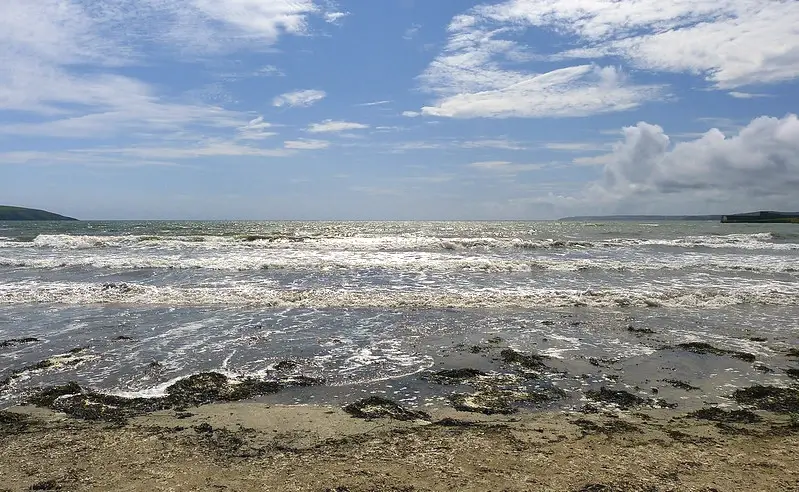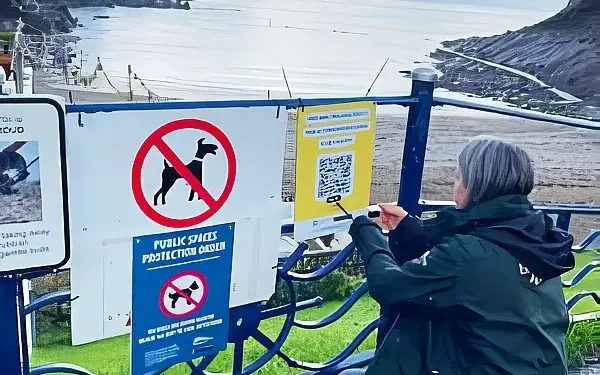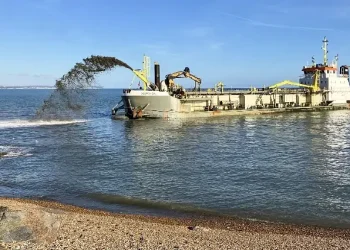Beachgoers in the South West are set to play a crucial role in protecting their local environments, thanks to a new AI-powered initiative by the Environment Agency.
Visitors to Par Beach in Cornwall and Combe Martin Beach in Devon can now interact with cutting-edge technology to both receive updates on bathing water quality and share valuable real-time information.
Introduction to the AI Trial
The Environment Agency has launched an innovative 12-week trial at two popular beaches, using Hello Lamp Post, an artificial intelligence platform.
This initiative allows beach visitors to stay informed about water quality and contribute to the Agency’s ongoing monitoring efforts by reporting their own observations.
Through QR-coded signs, people can scan and engage in a two-way conversation with the AI, providing essential information on environmental conditions, such as water clarity and signs of pollution.
How the AI Platform Works
Once visitors scan the QR code on-site, the AI system prompts them with questions about the current beach conditions. These include simple but important details like:
- How many people are in the water?
- Are there any dogs on the beach?
- Does the water appear clean and clear?
- Are there any noticeable signs of pollution?
This data, combined with traditional monitoring methods, helps the Environment Agency maintain a detailed understanding of local water quality, even outside of the regular sampling season, which ended in late September.

Bringing the Public into the Fold
This trial is a prime example of citizen science in action, encouraging the public to take ownership of their local environment.
By allowing beachgoers to engage directly with the project, the Environment Agency hopes to foster a stronger sense of responsibility and awareness.
In discussing the importance of the initiative, Hannah Amor of the Environment Agency’s citizen science team explained,
“Once you scan the QR code, you will get some conversational prompts. You will be able to tell us, via the AI platform, about any issues you can see or questions you have.”
This collaboration is particularly significant for beaches like Combe Martin, which received a ‘Good’ water quality rating.
Barbara Martin of Combe Martin Water Watch stated,
“We are proud of the ‘Good’ water quality rating for Combe Martin, and the lamp post scheme will help residents and visitors be better informed and empowered to report any concerns directly and instantly.”
A Personal View
As a former resident of the village for 8 years and regular visitor to the beach at Combe Martin, it is only fitting that this trial takes place there. Moreover, the beach’s unique characteristics make it an ideal location.
Not only is it breathtakingly beautiful, but it is also remarkably clean. Furthermore, the sea quality is consistently excellent, even with thousands of visitors each week during the peak Summer months.
Consequently, this environment supports an astonishing array of marine creatures, including seals, dolphins, porpoises, and even the occasional passing whale.

Benefits Beyond the AI Trial
This project also strengthens the long-standing work of community groups and environmental watchdogs. Friends of Par Beach, for example, has been involved in several water quality monitoring initiatives over the years.
Jenny Tagney, a representative of the group, noted that the AI trial provides crucial support to the Environment Agency’s existing efforts.
“We are really pleased to be supporting the Environment Agency in its efforts to understand the major influences affecting bathing water quality at Par Beach.”
This collaboration between technology, the public, and government bodies highlights the potential of AI to enhance traditional methods of environmental protection.
It also underscores the UK’s commitment to safeguarding its coastal areas by promoting both advanced technology and public participation.
Beach |
Water Quality Rating |
Duration of AI Trial |
|---|---|---|
| Par Beach | Good | 12 Weeks |
| Combe Martin | Good | 12 Weeks |
The Road Ahead for Citizen Science
The trial is a glimpse into the future of environmental monitoring, where technology and human input work hand in hand. The insights gathered during the trial will not only inform local authorities about immediate concerns but could also shape long-term strategies for managing and preserving these natural resources.
As environmental challenges grow more complex, initiatives like this serve as a pivotal reminder that individual actions, combined with AI, can contribute meaningfully to a larger cause. Moreover, this synergy underscores the significance of collaborative efforts.
Consequently, The Environment Agency’s AI citizen science project at South West beaches emerges as a pioneering model, potentially laying the groundwork for similar endeavors across the UK in the years to come.
Sources: THX News & Environment Agency.









